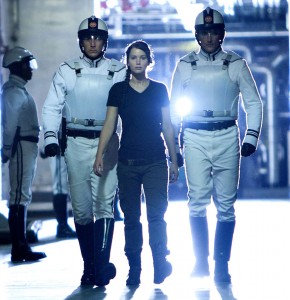Hunger Games copes with modern issues
What began as a mere spark of an idea in author Suzanne Collins’ mind, while she was simultaneously flipping between coverage of the war in Iraq and a reality television show, has swept the nation, creating a literary and cinematic phenomenon that rivals the likes of Harry Potter, Twilight and even Star Wars.
This craze is The Hunger Games, the novel-turned-movie that has had the world salivating since its production was announced in 2009.

Ultimate fighter · Jennifer Lawrence (middle) stars in The Hunger Games as a girl who steps in for her sister in the annual fight to the death between citizens of the various districts in her home country of Panem. - Photo courtesy of Murray Close
The film and books tell the remarkable story of 16-year-old heroine Katniss Everdeen (Jennifer Lawrence) who lives in the fictional post-apocalyptic, dystopian nation of Panem — formerly North America — consisting of 12 districts under the cruel dictatorship of the Capitol.
As a twisted punishment for a past uprising, the Capitol has enforced an annual nationally televised event called The Hunger Games, forcing one girl and one boy from each district to compete to the death until only one survivor remains.
So when Katniss’ little sister is selected as the female contender from District 12, Katniss instinctively volunteers to take her place and fight to the death with 23 other contenders, forcing her to rely on her sharp instincts, survival skills and the mentorship of drunken former victor Haymitch Abernathy (Woody Harrelson).
Producer Nina Jacobson worked tirelessly with Lions Gate Entertainment and Collins to capture the horror and inhumanity of the Games, while also allowing the film to examine the rich themes of personal sacrifice, star-crossed love and the harrowing future facing our society.
Jacobson and Lions Gate created a team headed by director Gary Ross, who offered the perfect fusion of epic and intimate storytelling abilities coupled with a deep passion and love for Katniss’ story.
“It was very clear that Gary really understood the book at the most fundamental level and that he could really appreciate [the story] from a fan and directorial point of view,” Jacobson said.
Ross felt an immediate connection to the book, spawned from the eager and passionate reactions of his own young children and the important messages he gleaned from the subject matter.
“This film is about the preservation of your humanity in the face of a system that seeks to rob you of your humanity, and that is something that I’ll always want to make a movie about,” Ross said. “If nobody had never heard this story, I would still want to make a movie about it.”
Then came the daunting task of casting the film, which was all the more challenging because of the fans’ voices with strong opinions of how the film should look.
“Everybody who reads it has a clear vision in their head of what the book should look like because the book is so personal to everybody, which is great,” Ross said. “But my job is to decide what connects to me personally because, as a director, that’s all you have.”
For the role of Katniss, Ross knew almost immediately after his first audition with Lawrence that she was not simply the right choice but the only choice.
“I have seen a lot of actors in my life, but I have never worked with someone more talented than Jennifer,” Ross gushed. “There’s a strength, an authority, a no-BS attitude to her that is everything Katniss represents.”
Lawrence, who previously admitted hesitancy in taking on roles in big-name Hollywood hits, ultimately realized that even in light of the fame, spotlight and possible stereotyping that the job would bring, the role of Katniss Everdeen was one she could not turn down.
“[Katniss] is incredible, iconic, heroic — this Joan of Arc — and if you’re going to be typecast for one character, it should be the best character you’ve ever read, and that’s what she was,” Lawrence said.
The rest of the cast includes an array of actors spanning every generation from the 13-year-old Amandla Stenberg in the pivotal role of Rue to the legendary Donald Sutherland as the brilliant yet twisted President Snow, Katniss’s chief adversary.
The cast even boasts one of USC’s own, sophomore Alexander Ludwig in the key role of Cato, the most fearsome of the tributes, whose final showdown with Katniss and Peeta is one of the most moving and gut-wrenching moments of the film, exposing the true corrosion of humanity inflicted by the Games.
Though the story yields a different meaning on a personal level to anyone who reads it, the cast agrees on a common modern implication of the story.
“We live in a world where our past, present and future have been defined by governments controlling their people by keeping them hungry and weak so they are not strong enough to fight back,” Lawrence said. “That is what this movie is about. We are the generation that can fight back.”
Sutherland, too, believes in the immense power of the underlying themes of The Hunger Games.
“This film has the possibility to change everything — to motivate, to catalyze, to activate whatever revolutionary instincts there are in what is essentially, a dormant generation,” Sutherland said. “This film could make them stand up and become aware through this allegory, the political structure that they live in and what needs to be changed. They could all become Katniss Everdeen.”

Sounds like life under an obama-type regime. The ‘future’ isn’t that far off kids.
Sounds like a pretty tried and true hollywood blockbuster that flirts with Orwellian overtones when its not zooming in for the date kiss scene